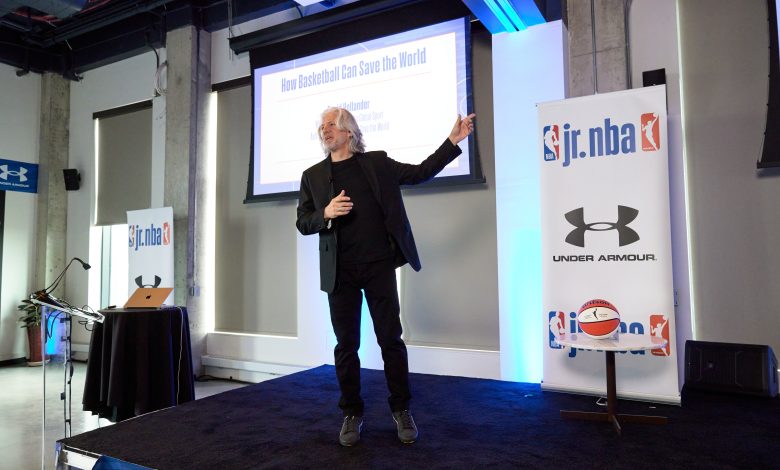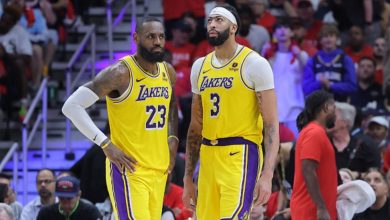Q&A: David Hollander on founding World Basketball Day


Founded by David Hollander International Basketball Day, which is celebrated annually on December 21.
Few can claim to have sparked a global movement like David Hollander. As a professor at the Tisch Institute for Global Sports at New York University, founder of International Basketball Day and author of the book How basketball can save the worldHe sees basketball as a universal language, one that transcends cultural boundaries and brings peace.
In August 2023, the United Nations officially recognized December 21 as World Basketball Day, the day on which Dr. James Naismith first introduced the game at the YMCA in Springfield in 1891. The historic solution, which was co-sponsored by 76 countries, made basketball The first team sport in the world. It is honored as the official International Day of the United Nations.
Hollander spoke with NBA.com about the creation of International Basketball Day and the impact of basketball around the world.
Editor's Note: The following interview has been edited and condensed for clarity.
NBA.com: You were instrumental in establishing International Basketball Day. Can you tell us the story of its creation and what it means to you on a personal level?
Hollander: In my book, published in February 2023, I argued that we need to start somewhere, something the whole world agrees on. I use my book to make the argument that basketball is that thing, and there is nothing that has the ubiquity and influence of the game across all cultural sectors. So in my book I drafted a UN resolution for World Basketball Day, then had my class flood the UN Ambassador's inbox to lobby for the creation of that resolution. This led to a meeting in June 2023 with Filipino diplomats from the United Nations, and in August 2023, thanks to hard work from both sides of the table, the World Basketball Day resolution was unanimously adopted, the fastest UN resolution from conception to adoption in the year of UN history.
Basketball can serve as a platform where countries can come together. I actually want people to play the game, which will create a feeling, and create a connection and understanding between other human beings in that special space of basketball. If enough people do this thing, on that day, in 50 years, it will be a day when peace will be felt everywhere.
NBA.com: When did it first occur to you that basketball was a global sport? Is there a particular moment or experience that stood out to you?
Hollander: It's funny because I never thought of it any other way. Wherever I travel, and I've been to many places on Earth, basketball courts are constantly visible. It is a shared space where everyone can participate. I love where the NBA is now in terms of global growth, and I don't think there's a sport that has been more intentional about becoming global. In the late 1890s, James Naismith sent boats to France, Brazil, Australia and China seeking to spread this beautiful game. It's amazing.
NBA.com: What can other regions, especially those outside basketball's traditional powerhouses like the United States and Europe, teach us about how the game evolves?
Hollander: I titled my book “How Basketball Can Save the World” not “How Basketball Can Save Basketball.” Basketball is fine. It's always been that way. Nikola Jokic famously said: “I don't jump high, I don't run fast, I just play basketball.” Which should make one wonder: “What does it mean to play basketball?” This means that this is a sport that recognizes as much human talent as possible. This is a sport that cannot be measured solely by individual greatness because it is, at its core, a team game. It's a sport where you watch a guy like Jokic, and there's potential for new categories that we haven't even measured for how great you can be at this game. So, although there are different styles and systems from a development perspective, the answer lies in the ambiguity of the game.
NBA.com: What is your vision for the future of basketball, and what role do you hope NBA Day will continue to play in shaping that future?
Hollander: I hope people will say that World Basketball Day was the initial platform on which the world began to recognize and reposition basketball as a value system and a social and development institution, on the same level as other global value systems, such as art, literature and science. I think basketball has that kind of power, and I hope that World Basketball Day is just the first statement of how much basketball can achieve.
NBA.com: If you could look 20 years into the future, where would you see basketball? What changes do you hope to see in the sport, both in terms of its global impact and cultural importance?
Hollander: I hope people see the game as a shortcut to peace and community. An acronym for interpersonal collaboration and inclusion. A gender-neutral way to communicate. It's almost like a periodic table of principles you can apply and combine to solve the world's most pressing problems. That's what I hope.
2024-12-17 16:54:13




